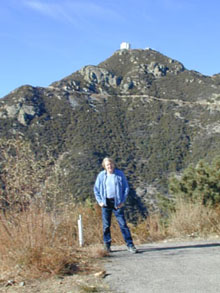 Interview
- Finessing lab space and course sections for physical sciences
Interview
- Finessing lab space and course sections for physical sciences
>>Master
of the Physical Sciences Collegiate Division since July 2000,
Simon Swordy is a professor in physics, astronomy & astrophysics,
the Enrico Fermi Institute, and the College. He came to Chicago
in 1979 "with a suitcase and 60 bucks in my pocket"
(and a research position) after earning his doctorate from Britain's
University of Bristol. When not donning his administrator's
or teacher's caps, the former Londoner conducts high-energy
astrophysics research at the Smithsonian Institution's Whipple
Observatory near Tucson and studies astronomical particles using
high-altitude balloons.
 What
does the master of the Physical Sciences Collegiate Division
do?
What
does the master of the Physical Sciences Collegiate Division
do?
Just as doing experimental research in physics and
astrophysics involves organizing groups, working out how to
get things done, making sure the work done is the best possible,
to some extent the master has similar tasks: figuring out what
classes we need to run, getting the right people to run them,
making sure the education in the Physical Sciences Collegiate
Division is as good as it should be. Why did I take the job?
I'm interested in making sure the education in the physical
sciences is valuable not just to students in physical sciences
but to those outside the field as well. There are 338 undergraduate
concentrators in all the physical sciences-compared to 488 economics
concentrators alone in the social sciences. So we must run classes
with a general feeling for nonmajors.
As
the College expands, we're also having to deal with the issue
of resources. We've gone from 3,600 to 4,000 students, and that's
taken up whatever slack we had in the system. Now we're adding
another 500 students [by 2005], and that presents the problems
of teaching space and availability of labs. You can't just stick
the extra people in the same classroom without somehow hurting
the educational experience.
Over
the top of all this is an extremely important question: what
is the role of science in the lives of people who have no intention
whatsoever of doing science in their future lives? They do not
need to know how to do it, but they should understand
how it works. It's one thing to understand how to calculate
the probability of, say, being hit by a bus. It's another to
understand what it means when someone says you have an X percent
chance of being hit by a bus. People need to understand how
we've arrived at that number and what it means in their lives.
It's the same with courses on evolution and geology-our role
is to get people understanding how our systems of thinking about
problems work.
So
that's the grand philosophical scheme behind this office's work,
but the reality is, How can I get a classroom for 120 students?
How can I get this faculty member to teach this class?
We spend a lot of time making sure there are enough sections
of a course so that the increasing class size won't dilute the
educational experience.
One of your goals is to connect more undergraduates to research
labs. How are you doing that?
You
could say we're still full of ideas but haven't hit on a way
to implement them yet. The reason the goal is important is that
it gives undergraduates a connection to some larger purpose
beyond the classroom. When people feel unhappy here, it's often
because they feel isolated, particularly from the faculty. If
we can get them into a lab, give them some mundane but essential
task, suddenly they're part of something.
It's
not easy to do, in part because of resources. In the long term
I'd like to establish a program to fund students' work in labs
with awards from the College.
Is there
a particular change for which you'd like to be a catalyst?
I'd
like to get better information out on course evaluations in
the physical sciences. The College has established an internal
Web site for this, but there are gaps in the physical-sciences
evaluations. This is because of the effort it requires to take
120 evaluations for one course and read and abstract them into
a short summary. We're working on two fronts: getting the manpower
to digest current evaluations, and changing the form to increase
multiple-choice options, which are easier to summarize. These
evaluations are useful for students and also for faculty. If,
for example,` I don't know what people think of the classes
I'm teaching, how can I know I'm succeeding?

![]()
 Interview
- Finessing lab space and course sections for physical sciences
Interview
- Finessing lab space and course sections for physical sciences
 What
does the master of the Physical Sciences Collegiate Division
do?
What
does the master of the Physical Sciences Collegiate Division
do?